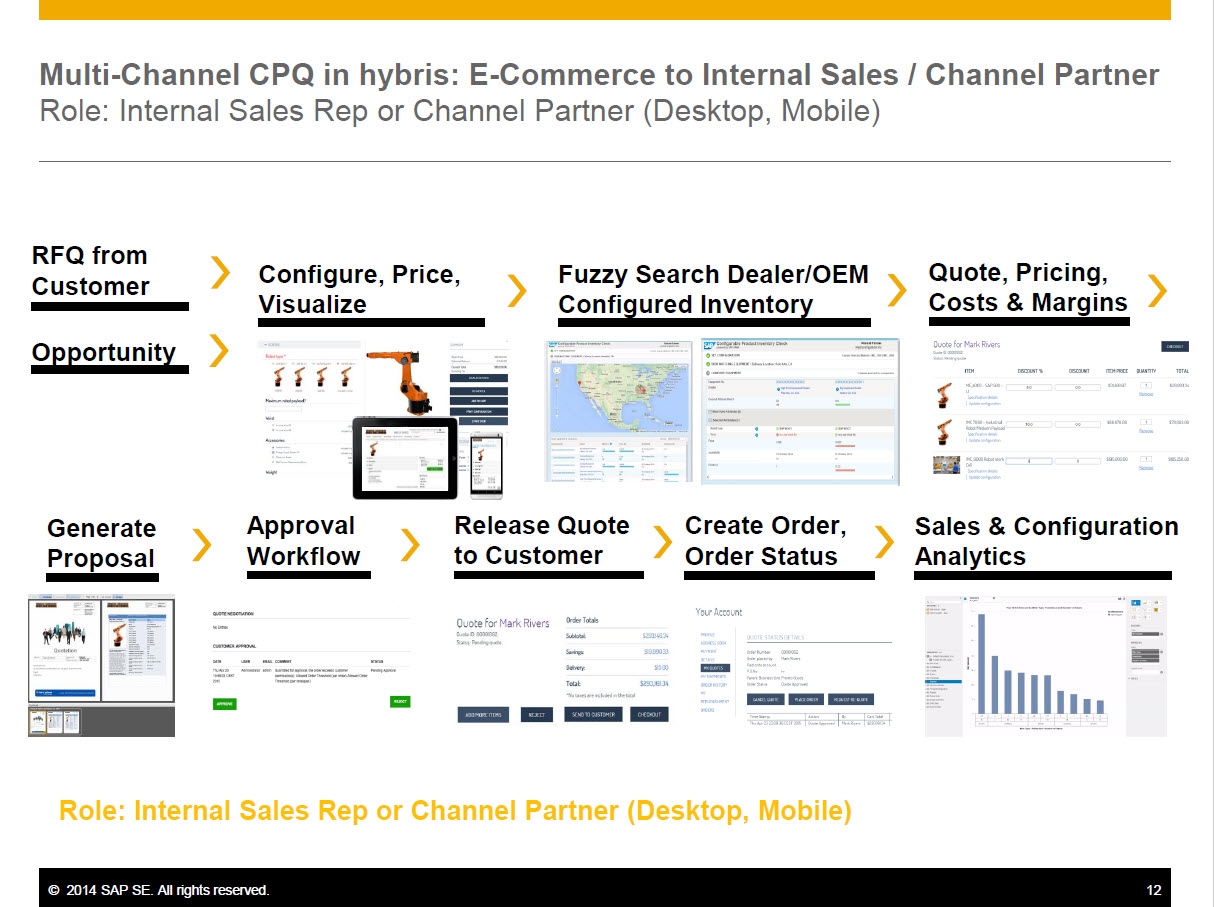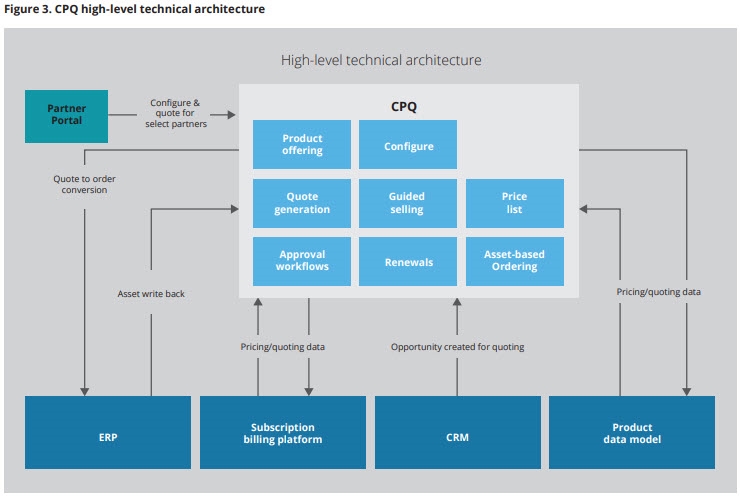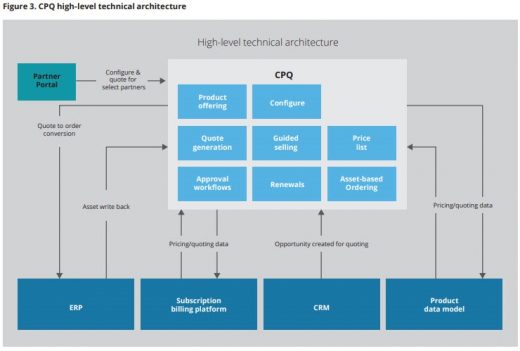What Needs To Be On Your CPQ Channel Roadmap In 2019
— August 29, 2019

Bottom Line: Adding new features to your CPQ channel selling platform directly benefits your resellers and channel partners, driving greater revenue, channel loyalty, and expansion into new markets.
Personalization Is Key To CPQ Succeeding In Channels
Sustaining and strengthening relationships across all indirect selling channels succeeds when dealers, multi-tier distributors, resellers, intermediaries, and service providers each can personalize the CPQ applications and platforms they use. Larger dealers, distributors, and resellers are adept at personalizing CPQ selling portals by the various roles in their organization. Personalization combined with a highly intuitive, configurable interface improves CPQ applications’ ease of use, enabling channel partners to get more done. The more intuitive and easy a CPQ application is to use, the more channel partners rely on it to place orders. When distributors are representing, on average, 12 different manufacturers, the one with the most intuitive, easily used CPQ system often gets the majority of sales.
Another aspect of personalization is defining levels of resellers. When many organizations first launch their CPQ channel selling strategies, one of the first requests they have is to organize all channel partners into performance categories. Differentiating channel partners on sales performance, customer satisfaction, and aftermarket revenue then gamifying how every one of them can move up a level is proving to be very effective at increasing channel sales. Competing with one another to be the top reseller for the manufacturing and service companies lifts an entire channel network to higher performance.
Every dealer, multi-tier distributor, reseller, intermediary, and service provider also has a unique way of selling that works best for their business. Another must-have feature on any CPQ channel roadmap is greater workflow flexibility to support increasingly complex, IoT- and AI-enabled configurable products. Smart, connected products are the future of manufacturing and channel sales. Capgemini estimates that the size of the connected products market will be $ 519B to $ 685B by 2020. Workflows like the one shown below of an internal sales rep using a multichannel CPQ system to order a customized product are due for a refresh to support even greater flexibility for more channels and greater product options.

Most Valuable Features For A CPQ Channel Roadmap In 2019
There’s a direct link between how effective a CPQ platform is across multi-tier distribution networks and the productivity of sales teams using them. 83% of sales teams are using CPQ apps today based on Accenture Interactive’s recent study, Empowering Your Sales Force: It’s Not Just Automation, It’s Personal (8 pp., PDF, no opt-in). There’s ample evidence that the more effective a CPQ platform is at equipping dealers, multi-tier distributors, resellers, intermediaries, and service providers, the greater the sales they achieve. The 2019 B2B Buyers Survey Report, by DemandGen in collaboration with DemandBase, found that B2B buyers are more likely to purchase from sales representatives who demonstrate a stronger knowledge of the solution area and the business landscape (65%) compared to competitors. B2B buyers also give high praise for sales teams who can provide quotes quickly and respond to their inquiries promptly (63%), in addition to providing higher-quality content (61%). Each of these benefits is derived from a CPQ platform that can scale across every phase of the selling lifecycle.
The following are the key features needed on CPQ channel roadmaps in 2019 to stay competitive and scale sales and revenue on pace with market growth:
- Greater personalization for each type of partner portal supported by real-time integration to CRM and ERP systems, designed to scale for sales team turnover across multi-tier distribution networks. Channel partners’ sales teams tend to churn quickly, and it’s best to design in intuitive, easily configured portals by sales role to help new hires get up to speed fast. Channel sales associates are typically the fastest-churning area of any selling business. With greater personalization comes the need for greater integration to provide the data needed to enable partner portals to have a greater depth of functionality. The following graphic from Deloitte’s recent study, Configure, Price, and Quote (CPQ) Capabilities illustrates this point:

- Support for multi-tier pricing, price management, price optimization, price enforcement, and special workflows, including Special Pricing Requests (SPR). Baseline CPQ platforms support price management and have successfully transitioned multi-tier distribution networks off of Microsoft Excel spreadsheets to a single pricing model that scales across all products and channels. Consider adopting advanced pricing logic to support SPRs so sales operations teams don’t have to do this process manually. In manufacturers who have transitioned from manual to automated SPR approvals, average deal sizes have increased over 60%, and productivity jumped over 76% according to a recent Gartner survey.
- Augment advanced product configuration tools by making them more intuitive and easier to use to sell the more advanced products in your catalog. It’s time to push the boundaries of CPQ channel selling systems to sell more complex products and drive greater revenue and margins. Forward-thinking manufacturers are taking a virtual design and 3D-based design approach to accomplish this. Enabling channel partners to take larger orders for more complex products is paying off.
- Upgrade guided selling strategies to be more than catalog-based selection systems, mining customer data using machine learning to see which products they have the greatest propensity to buy when. It’s time to migrate off of the guided selling systems that are selecting products from catalogs that may deliver the best gross margins or have a traditionally high attach rate with the product the customer is buying. Machine learning is making it possible to provide greater accuracy and precision to recommendations than ever before.
- Improve the usability of sales promotions, rebates, and most importantly, Market Development Funds (MDF). It’s amazing how much time manufacturers are spending manually handling MDF claims today. It’s time to automate this area of the CPQ channel roadmap and save thousands of hours and dollars a year while enabling resellers to get reimbursed faster or get the funds they need to grow their businesses.
- Contract management is a must-have for CPQ channel roadmaps today. Integrating a cloud-based contract management system into a CPQ platform is vital for taking one more step towards an end-to-end quote-to-cash workflow being in place. Real-time integration to contract management can save days of waiting for contract approvals, all leading to more closed deals and faster, more lucrative sales cycles.
- Manufacturers can realize greater revenue potential through their channels by combining machine learning insights to find those aftermarket customers most ready to buy while accelerating sales closing cycles with CPQ. Manufacturers want to make sure they are getting their fair share of the aftermarket. Using a machine learning-based application, they can help their resellers increase average deal sizes by knowing which products and services to offer when. They’ll also know when to present upsell and cross-sell offers into an account at a specific point in time when they will be most likely to lead to additional sales, all based on machine learning-based insights. Combining machine learning-based insights to guide resellers to the most valuable and highest probability customer accounts ready to buy with an intuitive CPQ system increases sales efficiency leading to higher revenues.
Conclusion
Now that the solutions exist for resellers to simplify CPQ selling strategies, it’s up to each manufacturer to decide how competitive they want their channel partner roadmap to be. Any given manufacturer’s quoting and configuration tools today are competing with 11 others on average for a reseller’s time, it is clear that roadmaps need a refresh to stay competitive. Suggested options include offering greater personalization, multi-tier pricing and a more thorough approach to price management, advanced product configuration support, revamped guided selling strategies and improved usability of sales promotions, rebates, and Market Development Funds (MDF). Manufacturers need to prioritize each of these features relative to their product- and revenue-specific goals by channel. A fascinating company who has deep expertise in designing, implementing, and scaling analytics, service, sales, IoT, and CPQ solutions for manufacturers is eLogic. The company’s mission is to enable manufacturers to achieve the highest value customer engagement and product & service lifecycle performance. eLogic is regarded as the leading system integration partner in CPQ and product configuration and is considered a global leader in delivering business solutions for manufacturers across SAP configuration technologies and Microsoft Dynamics 365, Power Platform & Azure.
Business & Finance Articles on Business 2 Community
(18)


